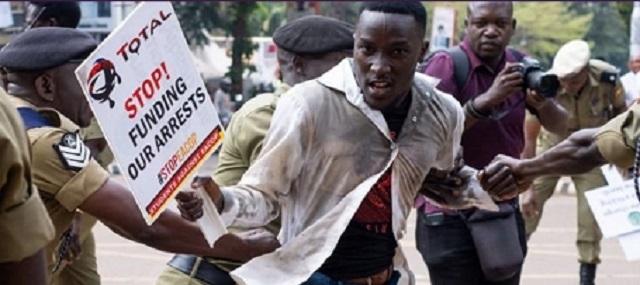
In the face of growing repression, Ugandans continue to find new and creative ways to combat the entrenched system of state capture
ANALYSIS | MICHELLE GAVIN | Ugandans have limited options when it comes to holding their political leaders accountable. Elections in the country have grown less and less credible over time. Civil society is vilified and intimidated by the state. News that Edward Awebwa, a twenty-four year old Ugandan, was sentenced to six years in prison for insulting the first family on TikTok is the only the latest in a long line of examples that prove how sensitive President Museveni and his inner circle have become. In one particularly absurd case in April, eight members of a musical group were arrested after being caught on a hot mic for complaining about the length of President Museveni’s speech at an anniversary party.
In a country where arbitrary arrest and torture is a real possibility for those who run afoul of the political elite, criticizing the state is an act of courage. But Ugandans continue to do just that. For over a year, thousands of them have contributed to online “exhibitions” that expose state failures, starting with potholes in Kampala and moving on to tackle substandard healthcare and even corruption in Parliament. They have seen some results; municipal officials and politically ambitious figures moved to fill some particularly large potholes, and some parliamentarians were arrested. Often with humour, and sometimes with real anger, Ugandans online refuse to pretend that they do not see the self-dealing of senior officials, or the very different rules that seem to apply to elites versus the rest of society.
Now, inspired by the success of Kenyan youth, whose nationwide mobilisation in June forced their government to reverse course on an unpopular set of new taxes, engage in more frank dialogue with protesters, and commit to reining in corruption, Ugandans are calling for an anti-corruption march of their own on July 23.
Just as online speech can land citizens in jail or worse, live demonstrations can elicit an extremely violent state response, as attendees at opposition rallies know well. In 2020, when supporters of opposition candidate Bobi Wine protested his arrest, at least 54 of them were killed, and many more were subsequently disappeared. The potential for bloodshed is very real.
President Museveni has clung to power for thirty-eight years by maintaining a system of patronage that allows him to co-opt potential rivals while intimidating others. A real campaign against corruption would threaten the foundation of that system. Because his regime and the state itself have become so conflated, he is bound to characterise a mass movement against corruption as a national security threat. At some point, the gulf between what is good for him and his inner circle and what Uganda’s young, digitally-savvy population wants may become impossible to bridge.
*****
Michelle Gavin and other experts track political and security developments across sub-Saharan Africa.
Source: Council on Foreign Relations blog
 The Independent Uganda: You get the Truth we Pay the Price
The Independent Uganda: You get the Truth we Pay the Price

